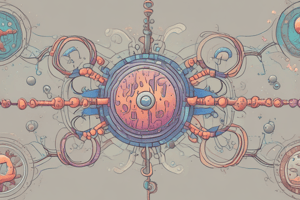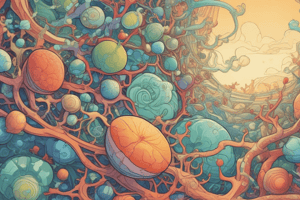Podcast
Questions and Answers
Which process involves the breakdown (oxidation) of food into small subunits and energy?
Which process involves the breakdown (oxidation) of food into small subunits and energy?
- Glycolysis
- Catabolism (correct)
- Anabolism
- Krebs's cycle
Where does the synthesis of micromoles into macromoles occur?
Where does the synthesis of micromoles into macromoles occur?
- In the cytoplasm (correct)
- In the nucleus
- In the mitochondria
- In the extracellular space
Which bacteria get energy from solar light?
Which bacteria get energy from solar light?
- Respiration bacteria
- Chemosynthetic bacteria
- Fermentation bacteria
- Photosynthetic bacteria (correct)
What is the universal intermediate formed from small subunits in microbial metabolism?
What is the universal intermediate formed from small subunits in microbial metabolism?
Where does the conversion of pyruvate into CO2, H+, energy, and electrons occur?
Where does the conversion of pyruvate into CO2, H+, energy, and electrons occur?
Microbial metabolism involves only anabolism and not catabolism.
Microbial metabolism involves only anabolism and not catabolism.
The tricarboxylic acid cycle (Krebs's cycle) occurs under both aerobic and anaerobic conditions.
The tricarboxylic acid cycle (Krebs's cycle) occurs under both aerobic and anaerobic conditions.
Chemosynthetic bacteria obtain energy from solar light.
Chemosynthetic bacteria obtain energy from solar light.
The breakdown of macromolecules into micromoles and energy is a part of catabolism.
The breakdown of macromolecules into micromoles and energy is a part of catabolism.
Glycolysis yields a significant amount of ATP under both aerobic and anaerobic conditions.
Glycolysis yields a significant amount of ATP under both aerobic and anaerobic conditions.
Electron transport chain occurs under both aerobic and anaerobic conditions.
Electron transport chain occurs under both aerobic and anaerobic conditions.
Photosynthetic bacteria obtain energy from solar light.
Photosynthetic bacteria obtain energy from solar light.
The breakdown of macromolecules into micromoles and energy is a part of catabolism.
The breakdown of macromolecules into micromoles and energy is a part of catabolism.
The tricarboxylic acid cycle (Krebs's cycle) yields a significant amount of ATP.
The tricarboxylic acid cycle (Krebs's cycle) yields a significant amount of ATP.
Microbial metabolism involves the synthesis of micromoles into macromoles but not the breakdown (oxidation) of food.
Microbial metabolism involves the synthesis of micromoles into macromoles but not the breakdown (oxidation) of food.
Flashcards are hidden until you start studying
Study Notes
Microbial Metabolism
- The process that involves the breakdown (oxidation) of food into small subunits and energy is microbial metabolism.
- Microbial metabolism involves both catabolism (breakdown of macromolecules into micromoles and energy) and anabolism (synthesis of micromoles into macromoles).
Energy Production
- Photosynthetic bacteria obtain energy from solar light.
- Chemosynthetic bacteria do not obtain energy from solar light.
Cellular Respiration
- The breakdown of macromolecules into micromoles and energy (catabolism) occurs in three stages: glycolysis, tricarboxylic acid cycle (Krebs's cycle), and electron transport chain.
- Glycolysis does not yield a significant amount of ATP under both aerobic and anaerobic conditions.
- The tricarboxylic acid cycle (Krebs's cycle) only occurs under aerobic conditions and does not yield a significant amount of ATP.
- Electron transport chain only occurs under aerobic conditions.
- The conversion of pyruvate into CO2, H+, energy, and electrons occurs in the electron transport chain.
Key Molecules
- Acetyl-CoA is the universal intermediate formed from small subunits in microbial metabolism.
Studying That Suits You
Use AI to generate personalized quizzes and flashcards to suit your learning preferences.




